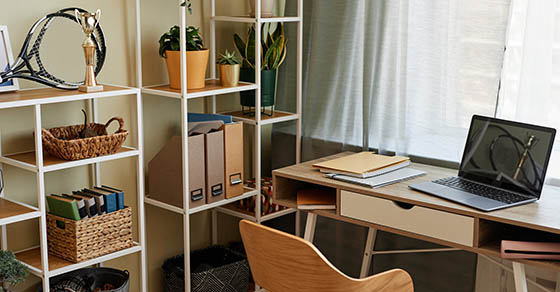If you are self-employed and run your business from home or perform certain function there, you may be eligible for certain deductions like home office expenses to decrease your business income.
The two methods for claiming this deduction are taking the actual expenses or using a simplified method.

How to qualify
In general, you qualify for home office deductions if part of your home is used “regularly and exclusively” as your principal place of business.
If your home isn’t your principal place of business, you may still be able to deduct home office expenses if:
- You physically meet with patients, clients or customers on your premises, or
- You use a storage area in your home (or a separate free-standing structure, such as a garage) exclusively and regularly for business.
Expenses you can deduct
Many eligible taxpayers deduct actual expenses when they claim home office deductions. Deductible home office expenses may include:
- Direct expenses, such as the cost of painting and carpeting a room used exclusively for business,
- A proportionate share of indirect expenses, including mortgage interest, rent, property taxes, utilities, repairs and insurance, and
- Depreciation.
But keeping track of actual expenses can take time and it requires organized recordkeeping.
The simpler method
Fortunately, there’s a simplified method: You can deduct $5 for each square foot of home office space, up to a maximum of $1,500.
The cap can make the simplified method less valuable for larger home office spaces. Even for small spaces, taxpayers may qualify for bigger deductions using the actual expense method. So, tracking your actual expenses can be worth it.
Changing methods
When claiming home office deductions, you’re not stuck with a particular method. For instance, you might choose the actual expense method on your 2022 return, use the simplified method when you file your 2023 return next year and then switch back to the actual expense method for 2024. The choice is yours.
What if I sell the home?
If you sell — at a profit — a home on which you claimed home office deductions, there may be tax implications. We can explain them to you.
Also be aware that the amount of your home office deductions is subject to limitations based on the income attributable to your use of the office. Other rules and limitations may apply. But any home office expenses that can’t be deducted because of these limitations can be carried over and deducted in later years.
Different rules for employees
Unfortunately, the Tax Cuts and Jobs Act suspended the business use of home office deductions from 2018 through 2025 for employees. Those who receive paychecks or Form W-2s aren’t eligible for deductions, even if they’re currently working from home because their employers closed their offices due to COVID-19.
Contact your Rudler, PSC advisor at 859-331-1717 to help you determine if you’re eligible for home office deductions and how to proceed in your situation.
RUDLER, PSC CPAs and Business Advisors
This week's Rudler Review is presented by Jenna Polston, Staff Accountant and Mark Benson, CPA, CVA.
If you would like to discuss your particular situation, contact Jenna or Mark at 859-331-1717.


As part of Rudler, PSC's commitment to true proactive client partnerships, we have encouraged our professionals to specialize in their areas of interest, providing clients with specialized knowledge and strategic relationships. Be sure to receive future Rudler Reviews for advice from our experts, sign up today !